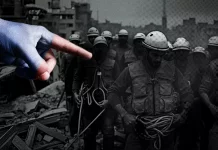By Oleksandr Sagan , theologist, for Lb.ua
Among the external factors opposing the receipt by the Orthodox Ukrainians of Tomos from the Patriarch of Constantinople, it’s the Russian factor that dominates above others. It consists of religious and secular components (the division into which, however, is conditional in present-day Russia).In the international arena, Moscow continues to oppose the recognition of Ukrainian autocephaly, actively involving not only the clerics of the Russian Orthodox Church, but also its diplomatic corps. This is especially noticeable in countries with their own Orthodox autocephalous churches. It is about the attempts to convince the local religious and secular (primarily – political) establishment in the inexpediency and future threats of such developments. Various ways are used to find incentives for officials, including authoritative church hierarchies and to influence the process in order to prevent the recognition of Ukrainian Orthodox autocephaly, LB.ua reports.
Lb.ua explains the narratives the Russian propaganda uses in countering Ukraine’s efforts and goes on to debunk them all.
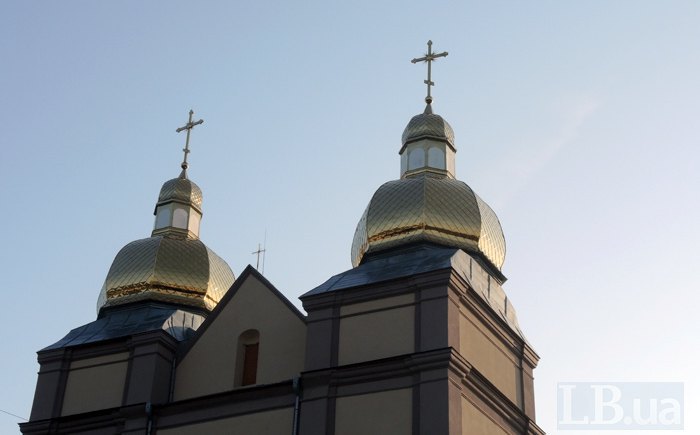
Thesis 1: “Autocephaly in Ukraine will cause a split in the global Orthodoxy, which can only be compared with the division between East and West in 1054. If this happens, Orthodox unity will be buried.”
Why this is not the case:
– The disagreement of the Moscow Patriarchate with the granting of the autocephaly to the Ukrainian Church by the Constantinople Patriarchate will not lead to a split in the global Orthodoxy, since such actions of the Ecumenical Patriarch are canonical and generally accepted. By the same principle, all local churches worldwide have already received autocephaly (except for the four Eastern patriarchates), including the Moscow Patriarchate itself. Therefore, Moscow’s possible move to end official relations (Eucharistic communion) with the Patriarchate of Constantinople will objectively see a negative or neutral assessment from virtually all Local Orthodox Churches.
– The Moscow Patriarchate self-proclaimed its autocephaly in 1448 and sought its recognition for 141 years (until 1589). Therefore, attempts by Moscow clerics and diplomats to accuse Ukrainian Orthodox believers of self-proclaimed autocephaly and an attempt to gain recognition are a manifestation of the policy of double standards that Moscow widely uses in its biased judgments and official statements.
– The Moscow Patriarchate throughout its existence has repeatedly resorted to actions that led to the violation of church canons and generally accepted norms in Orthodoxy. In particular:
a) Non-canonical usurpation (violation of conditions defined in the letter of the Ecumenical Patriarch) by the Moscow Patriarchate of the Kyiv Orthodox Metropolia in 1686; b) the self-granting by the Moscow Patriarchate of autocephaly to the “Orthodox Church in America” in 1970 (recognized by some churches from the countries of the so-called “socialist camp” – Bulgaria, Georgia, Poland, Czech Republic, and Slovakia). The Patriarchate of Constantinople and most of the local Orthodox Churches did not recognize that autocephaly; c) Moscow’s repeated threats to break off relations with Constantinople in the 1990s due to the granting of autonomy within the Ecumenical Patriarchate to the Orthodox churches of Finland, the UOC in the USA and the UOC in Canada. Ultimately, these threats were not realized and led to reputational losses for the Moscow Patriarchate. Only during the “Estonian Orthodox crisis” in February 1996 was the Eucharistic communion between the Moscow Patriarchate and the Patriarchate of Constantinople terminated. However, in May of the same year, it was restored thanks to the agreement of the parties to create two Orthodox jurisdictions on the territory of this country.
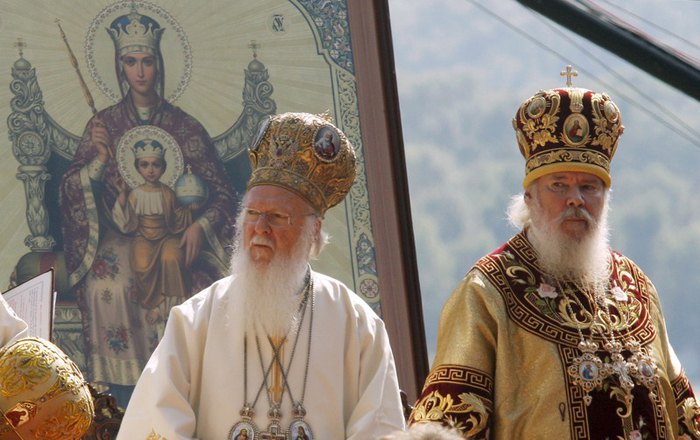
Thesis 2. “Providing a Tomos will lead to further division of the Orthodox Church in Ukraine, because the UOC of the Kyiv Patriarchate and the Ukrainian Autocephalous Orthodox Church are considered ‘non-canonical'”
Why this is not the case:
– Providing a Tomos on the opposite is aimed at eliminating the split in Ukrainian Orthodoxy by establishing an autocephalous local Orthodox Church in Ukraine, which will voluntarily include Orthodox hierarchs, as well as clergy and laity of all Orthodox jurisdictions that exist in Ukraine.
– After receiving Tomos, Ukraine will have no “non-canonical” believers. Therefore, the present “separation” of Orthodox believers will naturally disappear. The fears of the Moscow Patriarchate are connected with another thing – the possible withdrawal of a significant part of the Ukrainian believers from their Church. –
– Forecasting the deepening of the “split” (from the theological point of view regarding the situation in Ukraine it is more correct to talk about disengagement, since neither the UOC-KP nor the UAOC violated the canons and created no new doctrine), blocking and undermining the dialogue in Ukrainian Orthodoxy between the UOC-MP with “non-canonical UOC-KP and UAOC” – these fears are far-fetched. It is rather an attempt to manipulate this “dialogue.”
This is clearly evidenced by the events of 2017 when the appeal of the UOC-KP to the Moscow Patriarchate with the relevant proposals for restoring unity became an occasion for yet another propaganda campaign of the Kremlin.
And this is only one of the pieces of evidence that the Kremlin uses its Orthodox Church as an instrument of the state’s foreign policy for promoting the concept of the “Russian world” with the help of “political Orthodoxy.” The ultimate goal of such actions is to ensure Russian influence and even domination in the post-Soviet states.
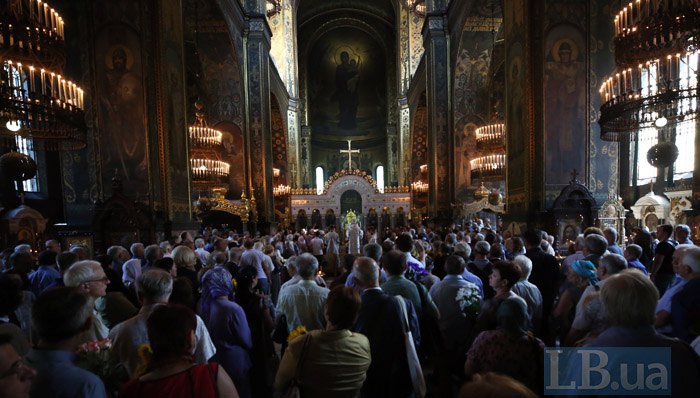
Thesis 3. “The submission to Patriarch Bartholomew of Constantinople of appeals from church and political institutions of Ukraine with a request to grant autocephaly is an interference of the Ukrainian state in the affairs of the Church since these appeals were not coordinated with the Moscow Patriarchate. This was not reported neither to Patriarch Kirill, nor Metropolitan of Kyiv and All Ukraine Onufriy.”
Why this is not the case:
– The appeal of the President of Ukraine to the Patriarch of Constantinople and the adoption of the relevant decision by the Verkhovna Rada of Ukraine is not an interference in the affairs of the Church, since it concerns the fulfillment by the head of state and people’s deputies of their constitutional duties and provisions of Law of Ukraine “On Freedom of Conscience and Religious Organizations.”
– Ukrainian political, ecclesiastical and public figures are not obliged to ask any permits from any representatives of other countries, institutions or public organizations. The expediency of sending appeals and forming relations with foreign political and religious centres, public organizations, financial and business circles is determined independently. According to Art. 5 of Law of Ukraine “On Freedom of Conscience and Religious Organizations,” in Ukraine, “the implementation of state policy regarding religion and the church belongs exclusively to the jurisdiction of Ukraine.”
– The Verkhovna Rada and President of Ukraine exercise the appropriate authority (in accordance with the Constitution and current legislation) to speak on behalf of the state and Ukrainian people and ensure respect for the rights and freedoms of Ukrainian citizens. According to Article 30 of this Law, the Ukrainian State must ensure “participation of religious organizations in international religious movements, forums, business contacts with international religious centres and foreign religious organizations.” All registered religious organizations are absolutely equal, and therefore they must be provided with the appropriate conditions for the free exercise of religious beliefs, including the mentioned interaction with foreign centres and religious organizations.
– The authorities cannot restrict the rights and freedoms of some citizens of Ukraine by creating privileges for individual political or religious institutions. Therefore, the very fact of the referral to the Ecumenical Patriarch for the provision of the Tomos on autocephaly testifies to an attempt to ensure a balance of interests of all interested Orthodox jurisdictions and to prevent the creation of prerequisites for the formation of privileges for any of them.
– The President of Ukraine held a personal meeting with the head of the UOC-MP Metropolitan Onufriy on April 18, 2018, during which the head of the UOC-MP was informed about the results of negotiations with Ecumenical Patriarch Bartholomew and members of the Synod of Constantinople.
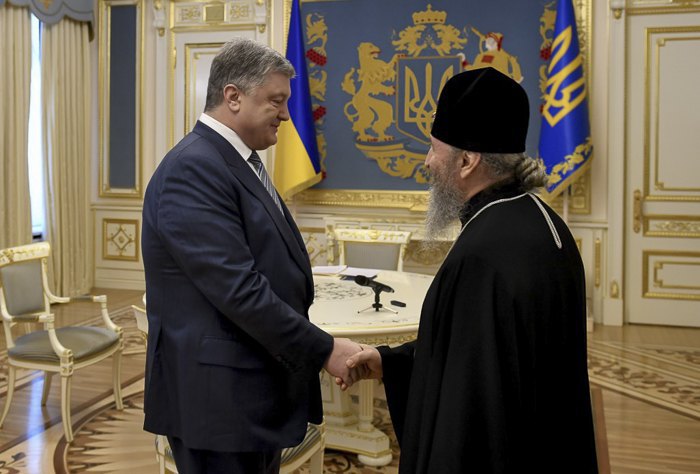
Thesis 4. “The question of proclaiming new autocephaly was considered in preparation for the Holy and Great Council of the Orthodox Church. All Local Orthodox Churches came to an agreement on the procedure and establishment of the order, according to which the process shall be valid only with the involvement of: the “mother church,” the ROC, as the initiator of granting autocephaly to its part; the Patriarch of Constantinople as coordinator in the search for a consensus between the Local Churches; all autocephalous Orthodox Churches. Without the coordinated will of these three parties to provide autocephaly, it is impossible for the Russian OC to agree on all aspects, except technical issues, namely protocol issues, such as the procedure for passing signatures. In the rest of issues, everything was agreed.”
Why this is not the case:
– Except for the Moscow Patriarchate, the Russian OC has never been recognized by anyone else as the Mother Church for the Kyiv Orthodox Metropolia (now – Orthodox jurisdictions on the territory of Ukraine).
– The Ecumenical Patriarchate has always proceeded and proceeds from the fact that the only one for Ukraine from the times of the Baptism of Kievan Rus in 988 remains the Church of Constantinople.- The Ecumenical Patriarchate in the Patriarchal and Synodal “Tomos on the recognition of the autocephaly of the Holy Orthodox Church in Poland” of November 13, 1924, confirmed Moscow’s violation of church canons. Namely: “… the estrangement from our Throne of the Metropolitan of Kyiv and the Orthodox Churches of Lithuania and Poland, dependent on it, as well as their attachment to the Holy Church of Moscow, from the very beginning, were not at all in accordance with the legal canonical prescriptions. Also, what was announced jointly on the complete ecclesiastical self-sufficiency of the Metropolitan of Kyiv, who bears the title of exarch of the Ecumenical Throne, was not observed…”
– The Ecumenical Patriarchate in the “Tomos on the recognition of the autocephaly of the Holy Orthodox Church in Poland” clearly defined the position regarding the right of sovereign states to the autocephalous church: “The organization of church affairs must follow political and social prototypes” (Canon of the 17th Ecumenical Council, Canon 38 of the VI Ecumenical Council)… Church rights, especially with regard to borders, shall be changed in accordance with political and administrative territorial sovereignty.”
– The question “about the method of proclaiming autocephaly” was withdrawn from consideration of the All-Orthodox Council (held in June 2016 on the island of Crete) as a conflict issue, on which no consensus was reached precisely because of the position of the Moscow Patriarchate, which, together with the Bulgarian, Antiochian and Georgian Orthodox Churches, virtually boycotted the Council. When discussing the issue at the Pre-Council meetings, representatives of the Moscow Patriarchate denied the right of the Ecumenical Patriarch to provide on their own autocephaly to the Orthodox Church and offered to envisage procedures for forming an appeal from the Church that is willing to receive autocephaly and obtaining appropriate consent. The Ecumenical Patriarch has compulsorily agreed to these and some other “proposals” (for example, the right to sign, but not approve (!) the Tomos by all Primate of the Local Orthodox Churches, etc.) However, further consideration and presentation of the issue to the All-Orthodox Council in 2016 was blocked and became impossible solely because of Moscow’s position.
– The Patriarchate of Constantinople proceeds from the premise that, due to lack of consensus and non-consideration at the All-Orthodox Council, the right and way of granting autocephaly remains unchanged. Therefore, all agreed compromises are considered to be those that have not been achieved because of a lack of final agreement. – Because of the lack of a constructive position (ignoring the Holy and Great Council of the Orthodox Church) and insisting on non-technical technical issues, which led to a halt in the process of reconciliation by the Churches, the Moscow Patriarchate actually lost the opportunity to block the granting by the Ecumenical Patriarch of the autocephaly to any Church, including the provision of the Tomos to the Ukrainian Orthodox Church .
– After all the statements about not recognizing the developments and decisions of the Holy and Great Council of the Orthodox Church, Moscow’s current attempts to interpret the results of the Pre-Council meetings in its favour are cynical and insignificant.
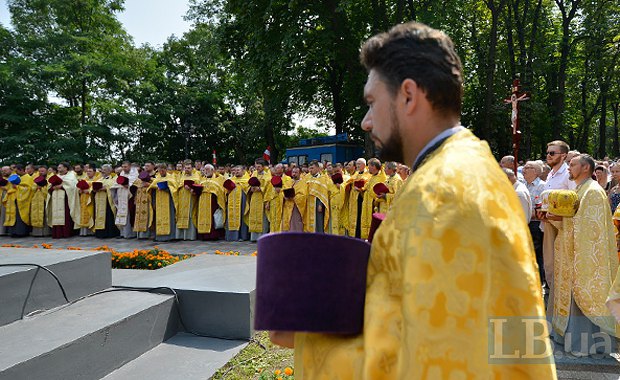
Thesis 5. “The process of proclaiming Ukrainian autocephaly is initiated not only without the consent of the Russian OC, but even bypassing the ‘canonical’ UOC-MP. Instead, the fate of Orthodoxy in Ukraine is resolved by “schismatics”, state authorities and members of the Ukrainian parliament, many of whom are Uniates or representatives of other religions and denominations. And in general, getting a Tomos can become the beginning of the transition of Orthodox Ukrainians to a Union.”
Why this is not the case:
– The UOC-MP never doubted that autocephaly should be received/recognized. In November 1991, the Local Council of the UOC-MP took place in the Kyiv-Pechersk Lavra. In the “Definition of the UOC Council on the issue of complete independence of the UOC” it was said that the proclamation of the independence of the Ukrainian state requires a new status from the Church. And such status should be full independence, that is autocephaly. The gift of autocephaly will contribute to strengthening the unity of Orthodoxy in Ukraine, will serve toward uniting citizens of all nationalities living in Ukraine, and thereby make a contribution to strengthening the unity of the entire Ukrainian people. – Even the participants in the scandalous (convoked with violation of the current Charter of the UOC-MP) Bishops’ Council, which was held in Kharkiv on May 27, 1992, in their letter to the then President of Ukraine L. Kravchuk, wrote that they unanimously “approve and support the aspirations of the Ukrainian Orthodox flock to full independence” and will take all measures to solve “this vital question of our Church.”
– The head of the “canonical” UOC MP Metropolitan of Kyiv and All Ukraine, Onufriy, at a meeting with the President of Ukraine on April 18, 2018, was fully informed about the possibility of and conditions for granting autocephaly to the Orthodox Church in Ukraine.
– The UOC MP and its hierarchs have the unconditional right to freely choose – to participate in the creation of the Ukrainian Local OC along with representatives of other Orthodox jurisdictions or to maintain administrative unity and be part of the Moscow Patriarchate. – The President of Ukraine and the Parliament act in strict accordance with the Constitution of Ukraine and Law of Ukraine “On Freedom of Conscience and Religious Organizations,” in particular Article 5 of the Law, according to which “… in Ukraine the implementation of state policy on religion and the church belongs exclusively to the jurisdiction of Ukraine … ”
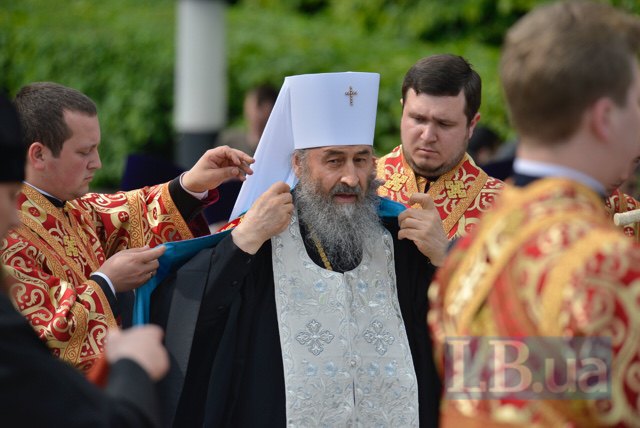
– The claims of the Russian OC and its branch in Ukraine, the UOC-MP, about the need for the state bodies to coordinate their actions with them is an attempt to create a privileged position for themselves. And this is a violation of the provisions of Art. 5 of Law of Ukraine “On Freedom of Conscience and Religious Organizations,” according to which “all religions, faiths and religious organizations are equal before the law.”
– Support by the Ukrainian Greek Catholics of the aspirations of the Orthodox Church toward the recognition of the autocephaly of the Orthodox Church in Ukraine is evidence of a Christian attitude toward representatives of another confession. And it is also a manifestation of the state position of the citizens of Ukraine who care about the national security of their country (experts say that the issue of a local church in Ukraine is not only a religious issue, but also an important aspect of national security).
– The reproach on the domination of the “Uniates” in the Ukrainian parliament is purely a propaganda cliche and is designed for pro-Moscow radical-oriented political and religious circles. By analogy, one can object to the right of the Polish government in 1924 (which in fact was 100% Roman Catholic) to appeal to the Ecumenical Patriarch about the autocephaly of the Polish Orthodox Church and, as a consequence, the Tomos’s effect on its autocephaly. – To bind the Tomos’s receipt on autocephaly with the transition to a Union is to completely ignore the whole history and philosophy of the development of the Universal Orthodoxy. According to this logic, all Local Orthodox Churches, which are now part of the Orthodox diptych (the list of Churches), are Uniate. But among these churches is also the Moscow Patriarchate.
By Oleksandr Sagan , theologist, for Lb.ua
The translation of this article is courtesy of the Ukrainian news agency UNIAN.


